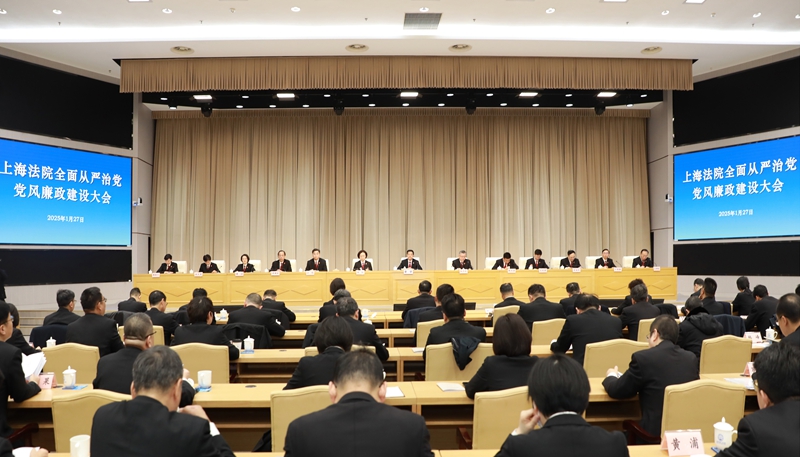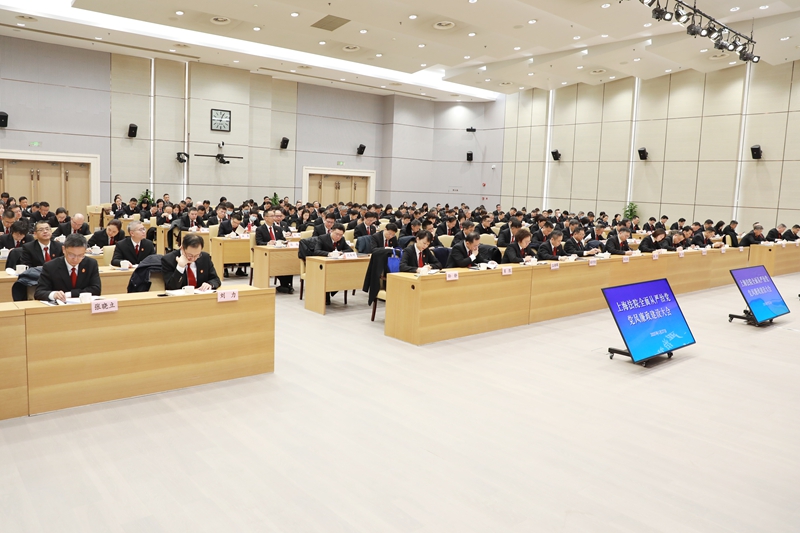
 Your current location >> Picture News
Your current location >> Picture News


On January 27, the Shanghai High People's
Court (hereinafter referred to as SHPC) held a meeting on the comprehensive and
strict governance of the Party, construction of honest administration of Party
style, and anti-corruption efforts in the city's courts. The meeting focused on
thoroughly studying the important speech by the general secretary Xi Jinping at
the 4th Plenary Session of the 20th Central Commission for Discipline
Inspection of the Communist Party of China, and implementing the spirit of it
and the Fourth Plenary Session of the 12th Shanghai Municipal Discipline
Inspection Commission of the Communist Party of China. It also outlined plans
for the comprehensive and strict governance of the Party in 2025. Jia Yu,
secretary of the Party Leadership Group and President of the SHPC, attended the
meeting and delivered a speech. Participants included members of the leadership
teams from the SHPC and intermediate people's courts, court leaders,
bureau-level officials, members of leadership teams of district courts and the
Shanghai Railway Transportation Court, heads of various departments of the
Shanghai High Peopleí»s Court, and officials in charge of supervision and
discipline inspection in each court.
Jia Yu, the secretary of the Party Leadership
Group and president of the SHPC, reviewed the work on the construction of
honest administration of Party style and anti-corruption efforts in the city's
courts in 2024 and analyzed the current situation of honest administration of
Party style in the courts. President Jia Yu called on all courts in the city to
thoroughly study and implement the important speech of the general secretary Xi
Jinping, and to unswervingly advance the comprehensive and strict governance of
the Party, in order to effectively carry out the construction of honest
administration of Party style and anti-corruption in 2025. He called for a
profound understanding of the new situation in the anti-corruption struggle, a
firm commitment to the ideological and practical consciousness of
self-revolution, and an unwavering adherence to the principle of strictness to
the end. He emphasized the need to profoundly grasp the new requirements of
comprehensive and strict governance of the Party in the new era and to persist
in promoting both symptomatic and root cause treatment, and systematic
treatment, with a reform-minded spirit. It is essential to adhere to a
problem-oriented approach and win the tough, protracted and overall battle
against corruption. Faced with issues such as í░internal personnel corrupting
Party members by luring themí▒, violations of discipline despite prohibitions,
multi-level involvement in illegal activities, and recurrence of problems, it
is crucial to carry forward the spirit of struggle and make in-depth and
practical efforts to promote reform and governance through cases. We must
closely focus on the modernization of judicial work and take the lead in
comprehensively and strictly governing the Party. Political supervision shall
be closely integrated with judicial inspection and district committee
inspection to deepen and solidify political oversight. Moreover, continuously
consolidate and deepen the outcomes of Party discipline education, integrating
discipline education into daily routines and making it a regular practice.
Adhere to promote both symptomatic and root cause treatment, strengthen
constraints and supervision, and actively advance big data supervision. Last
but not least, highlight the role of í░key fewí▒, insist on making good use of
the í░responsibility list, problem list, and task listí▒, and fully implement the
main responsibility.
Lu Weimin, deputy secretary of the Party
Leadership Group and vice president of the SHPC, presided over the seminar.
Zhao Jieying, member of the Party Leadership Group of SHPC and Chief Inspector
of the Discipline Inspection and Supervision Office of SHPC stationed by the
Shanghai Municipal Commission for Discipline Inspection and Supervision,
conveyed the relevant meeting spirit, reported on the handling of clues of
disciplinary violations in the cityí»s courts in 2024, and outlined the key points
of discipline inspection and supervision work for 2025.
>> Chinese Version
